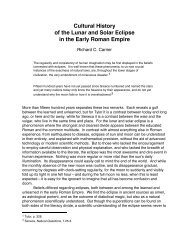Herod the Procurator - Richard Carrier
Herod the Procurator - Richard Carrier
Herod the Procurator - Richard Carrier
Create successful ePaper yourself
Turn your PDF publications into a flip-book with our unique Google optimized e-Paper software.
conjecture of Coele-Syria for “all Syria”), simply because what Josephus said entailed<br />
something “more extensive and important” than <strong>Richard</strong>son thought possible. Since <strong>the</strong>n<br />
only Anthony Barrett has gotten close to a correct analysis of <strong>the</strong> matter , which<br />
corroborates what I will argue here. 54<br />
The Meaning of ‘<strong>Procurator</strong>’<br />
All this brings us back to Walter Otto, who writes that “Augustus instructed <strong>the</strong> of ficials<br />
[den Beamten] of <strong>the</strong> Roman government in Syria to handle af fairs <strong>the</strong>re solely in<br />
agreement with <strong>Herod</strong>, but of course gave no legal authority over <strong>the</strong> province to <strong>the</strong><br />
vassal <strong>Herod</strong>, although a passage in Josephus seems to suggest this.” 55 He <strong>the</strong>n elaborates<br />
in a lengthy footnote what he means, <strong>the</strong> most anyone had ever written on <strong>the</strong> subject<br />
(until Barrett). My translation of his note follows:<br />
The passages are obscure, and in <strong>the</strong> one from <strong>the</strong> AJ something is<br />
probably missing, but in any case it seems impossible to me to read<br />
epitropos here in <strong>the</strong> technical sense of procurator, not only because it is a<br />
Roman of fice, but simply <strong>the</strong> fact that <strong>Herod</strong> is being granted this title<br />
(just as, e.g., in Caesar ’s grant of such a position to <strong>Herod</strong>’ s fa<strong>the</strong>r ,<br />
Antipater, <strong>the</strong> word epitropos is not used by Josephus in its technical<br />
meaning, cf. BJ I 199: pasês epitropos Ioudaias; also AJ XIV 143 and<br />
166). Naturally it is completely impossible to conclude from this, with<br />
Gardthausen, op. cit. I 818, that <strong>Herod</strong> was appointed chief tax-farmer of<br />
Syria [on which see below—ed.]. And it’s undesirable to change holês in<br />
<strong>the</strong> BJ to Koilês (as suggested by Marquardt, Röm. St.-V. 2 I 408, 2, but he<br />
incorrectly assesses <strong>the</strong> whole position of <strong>Herod</strong>), so one must take <strong>the</strong><br />
passage from <strong>the</strong> BJ as a huge exaggeration, since it results in <strong>the</strong><br />
impossibility of putting <strong>the</strong> vassal <strong>Herod</strong> over an entire Roman province<br />
(cf. p. 19, where <strong>the</strong> same impossibility has already been rejected once),<br />
and instead base <strong>the</strong> facts on <strong>the</strong> passage in <strong>the</strong> AJ (particularly <strong>the</strong> word<br />
gnômê, <strong>the</strong> symboulia in <strong>the</strong> BJ representing yet ano<strong>the</strong>r amplification).<br />
54 See Barrett, op. cit. (though correct and valuable in his analysis, he is hesitant to declare a certain<br />
conclusion because, I believe, he overlooks <strong>the</strong> fact that, as we shall see, in principle and in practice <strong>the</strong><br />
same person could be appointed both procurator and prefect, and Josephus only says that <strong>Herod</strong> was<br />
appointed <strong>the</strong> one, not <strong>the</strong> o<strong>the</strong>r; by contrast, Eck, op. cit., correctly detects <strong>the</strong> fact of dual appointment,<br />
but doesn’t discuss <strong>Herod</strong> in this connection, as he only treats events after 6 A.D.).<br />
55 Walter Otto, “<strong>Herod</strong>es,” Paulys Realencyclopädie der Classischen Altertumswissenschaft, Suppl. II,<br />
1913, p. 71.<br />
18








